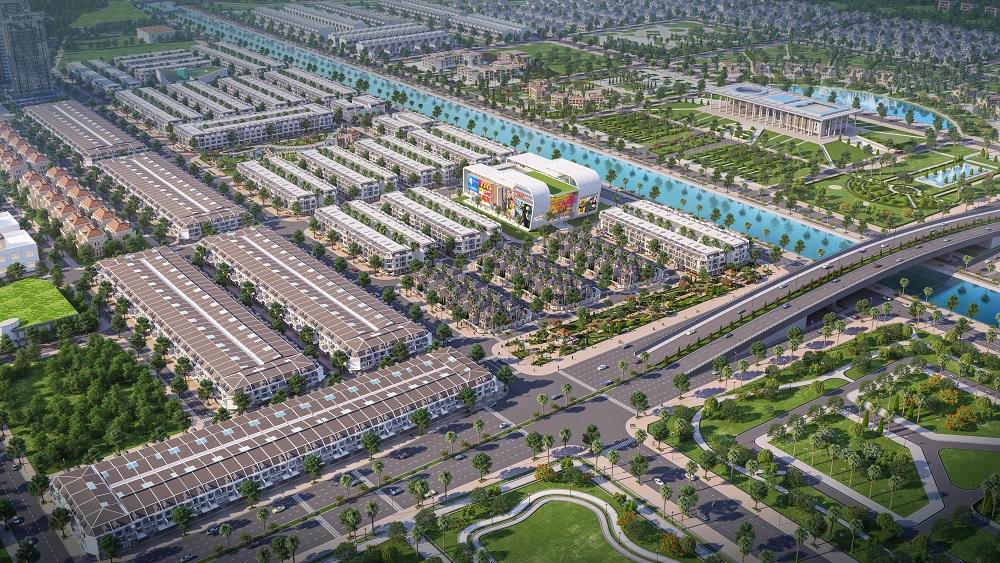Since the beginning of 2019, numerous developers have launched new property projects in the Mekong Delta region, taking advantage of large and abundant land sites of the region.
Specifically, Cat Tuong Group deployed it new urban area project called Cat Tuong Western Pearl, which take up 78 hectares of Vi Thanh city, Hau Giang province. Another developer, LDG Group also introduced Thanh Do townhouse project in O Mon, Can Tho with the total investment of more than VND350 billion. LinkHouse joined the game by launching its project Van Phat Residence in Cai Tac, Hau Giang.The 15-hectare project FLC La Vista Sadec, was kicked off by FLC Group in Sadec City during the same period. Recently, TNR Holdings Vietnam launched TNR Stars Thoai Son project land on an area of 11.29 hectares in Thoai Son, An Giang. Kita Group announced its new project - the Stella Mega City - in Can Tho with 5,000 townhouses and villas.
Earlier, in 2018, real estate giants including Vingroup, Muong Thanh, Van Phu Invest, Phu Cuong Group, Ceo Group, Sun Group, Thu Duc House, Nam Long Group, T&T Group, and DIC Group, also invested in “clean” land sites in the Mekong Delta region with the aim of targeting all property segments.
Not only the major competitors of the real estate market, but individual investors have also poured their money in this region. Investors from big cities such as Ho Chi Minh, Hanoi, or Binh Duong, have invested in the Mekong Delta region, which pushed the housing price of the local market up high.
According to Batdongsan.com.vn’s reporter, in the past 2 years, property prices in Can Tho recorded a significant change. In the central area, housing prices now increase by 150-200% compared to 2017. Residential land in Ninh Kieu residential area fluctuated at VND23 – 35 million /sqm. In An Khanh Ward, properties with frontages on main roads have a price ranged from VND70 to 90 million /sqm. The Southern area of Can Tho, Cai Rang district, has a high land price range of VND20-40 million/sqm.

In Kien Giang, right after the uptrend of Phu Quoc market, the flow of investment started shifting to Ha Thien and Rach Gia. Project land prices in these areas increased from VND5-7 million VND/sqm to VND8-15 million /sqm. An Giang, the city once had the slowest development speed in the region, also experienced a 40-50% price increase after only 2 years thanks to the new investment flows of major developers.
Similarly, cities such as Ben Tre, Dong Thap, or Hau Giang, are now hotspots among real estate investors with various projects launched. The land price in these also rose by 30-35% compared to 2017.
Giving his opinion about the Mekong Delta real estate market, Mr. Nguyen Hoai Danh, Marketing Director of Cat Tuong Group, said there are four main reasons leading to the increase in real estate prices on the local market.
Firstly, the scarcity of real estate supply, especially the decreasing amount of land sites in Ho Chi Minh City, has been the main factor of rising land price, which creates difficulties for investors. As the cash flow could not stay in Ho Chi Minh City market, it began to shift to other potential markets, which the Mekong Delta is one of those. The emergence of large developers in this area has raised the expectation of investors for the new market, which lured more players to join.
Secondly, the economic development of the Mekong Delta region in the past few years has created more jobs for locals, which led to residential movement and an increase in demand for accommodation. Despite the large land supply, the lack of well-planned projects led to the situation of insufficient supply and demand followed by great fluctuation in price.
Thirdly, real estate prices always increase in proportion to the synchronization of transport infrastructure. In recent years, transportation infrastructure projects in the region have fastened the urbanization process in Western provinces, attracting more and more real estate investors. In the coming time, the completion of “trillions-worth” infrastructure will be the new leverage for the Southwest housing value to keep rising.
Finally, more and more well-planned projects are launched by prestigious developers, which improve the standard of housing quality in the region and also push the housing price up.
Mr Danh also stated that Mekong Delta provinces has been an attractive market for large corporations for years. This is not a temporary trend but, instead, an inevitable need. As the infrastructure completed connecting the Mekong Delta provinces with Ho Chi Minh City, it would open up great investment opportunities as well as increase the price. It is expected that this market will continue to attract more real estate businesses as well as investing cash flow while there is still plenty of room for development.


















